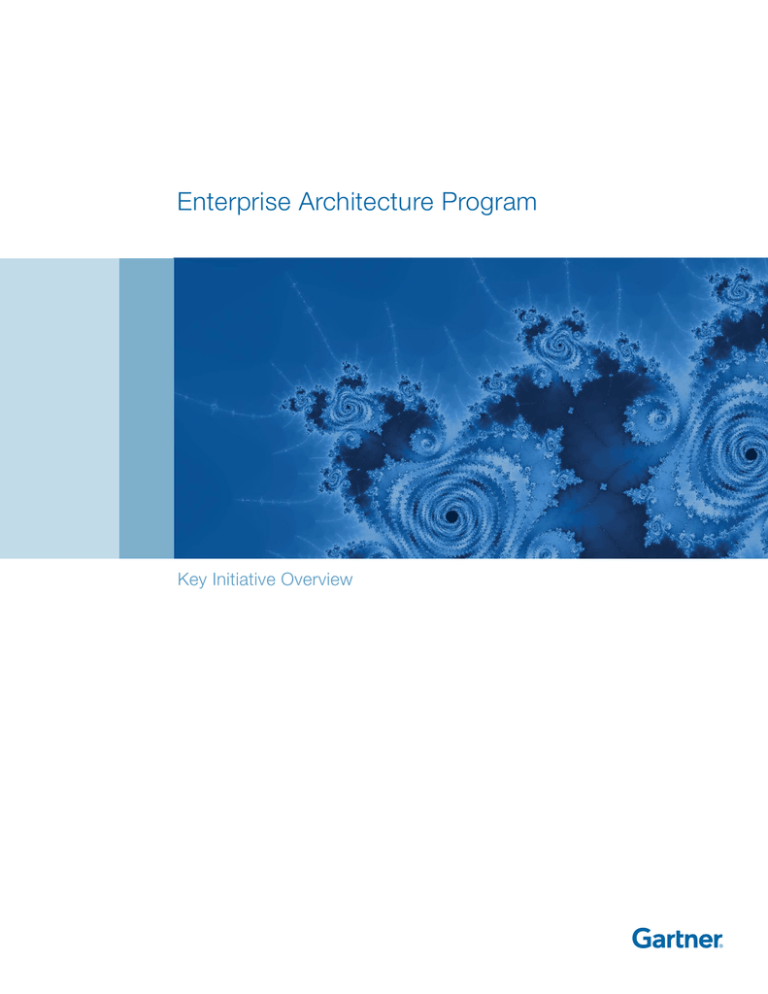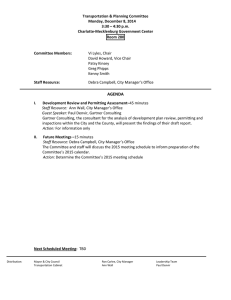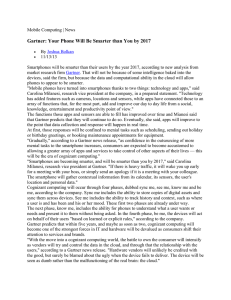
Enterprise Architecture Program
Key Initiative Overview
®
Enterprise Architecture Program Key Initiative Overview
Richard Buchanan
Research Managing Vice President
This overview provides a high-level description of the Enterprise Architecture Program
Key Initiative. IT leaders can use this guide to understand what they need to do to
prepare for this initiative.
Analysis
Enterprise architecture (EA) is a strategic planning process that translates an enterprise’s business vision
and strategy into effective enterprise change.
The EA program institutes a collaborative, shared planning process. EA teams work with business and
IT stakeholders to define a future-state vision in terms of requirements, principles and models. They then
compare the future-state vision to the current state, identify gaps and plan investments to fill them. EA
is not IT-focused, but business-driven and comprehensive. The future-state vision helps coordinate the
analysis of—and develop a plan to harmonize—required changes in business functions and processes,
information and data provisioning, technology capabilities and application solutions. An effective
EA program will help align IT investments with long-term strategy, reduce risk, deliver higher-quality
information and engineer adaptive solutions and technical services.
Consider these factors to determine your readiness
EA planners must charter the program and ensure that senior leaders support it. They must also establish
program milestones, plan ongoing refinements and devise strategies to tackle hurdles such as how to:
• Assess EA program maturity, and improve it.
• Define EA in a useful way.
• Explain the business benefits of the EA program.
• Gain credibility and build momentum by picking “low-hanging fruit” projects.
• Use EA to improve the quality of information for decision making.
Conduct your enterprise architecture program in six phases
Gartner recommends that chief architects and their teams establish and evolve the EA program using six
major phases. The phases may vary depending on the problems you are trying to solve and the decisions
you are trying to make:
• Strategize and plan: Gain agreement on the major problems to be solved; charter the EA program;
and develop a future-state description comprising the requirements, principles and models.
• Assess current state: Identify your current level of strategic and EA maturity; gather existing
documents that describe your business and technology capabilities, practices, formal process models,
data and systems.
• Assess competencies: Identify budgetary, staffing and other requirements to prepare the business
for the analysis of strategy. Review the established budgeting mechanisms and processes used in the
business and strategic-planning organizations, and consider refining them.
• Gain approval: Leveraging the charter from phase one, provide business and IT executives with
a formal plan, and bring business and IT experts together for a shared strategic-planning exercise.
Develop the requirements, and assess the results.
• Implement: Analyze the findings from strategic-planning and EA efforts to prioritize the gaps to be
filled. Develop investment plans using business cases that emerged from EA efforts. Present the
findings to stakeholders and leaders to get investment plans approved.
• Operate and evolve: Improve and refine your efforts. Over time, the future state will be articulated in
greater detail.
gartner.com/ea
© 2010 Gartner, Inc. and/or its affiliates. All rights reserved. Gartner is a registered trademark of Gartner, Inc. or its affiliates.
For more information, e-mail info@gartner.com or visit gartner.com. EUKEINEAPROVRW012110
®
Enterprise Architecture Program Key Initiative Overview
Read More From Gartner About Enterprise
Architecture Programs
The following is just a sampling of the research and tools Gartner clients have access to every day.
Strategize and plan
The CFO’s Essential Guide to Enterprise Architecture
ID: G00167209
CFO concerns and enterprise architecture issues align in many areas, but a lack of dialogue between
the two parties often prevents the synthesis of results. Enterprise architects and CFOs will find a morecollaborative relationship to be mutually beneficial.
Five Best Practices for Building the Enterprise Architecture Team
ID: G00164979
One of the greatest challenges faced by chief architects is to facilitate, engage, inspire and coordinate
people from across the enterprise to work as a team. Failure in this critical activity can doom an EA
initiative.
Enterprise Architecture Research Index: Integrating Enterprise Architecture With Business Strategy
ID: G00166041
This research index presents Gartner’s considerable published research on improving the business
strategy alignment of enterprise architecture work, with specific focus on the business context and
common requirements vision definition.
Assess current state
Five Questions the CIO Should Be Asking About Enterprise Architecture
ID: G00167384
In the current economic climate, an effective enterprise architecture program is a necessity, not a luxury.
These five questions will help CIOs ensure that the EA initiative is on track to deliver business value.
Toolkit: Basic Enterprise Architecture Metrics
ID: G00146170
This sample template shows how a retail bank captured and organized the metrics it used to
communicate enterprise architecture compliance and effectiveness.
Toolkit: Business Issues for EA and Your Enterprise Personality Assessment
ID: G00170393
This tool uses the Gartner Enterprise Personality Profile to provide guidance on critical enterprise
architecture issues. Factoring organizational culture into the guidance increases the chances of EA
success.
gartner.com/ea
© 2010 Gartner, Inc. and/or its affiliates. All rights reserved. Gartner is a registered trademark of Gartner, Inc. or its affiliates.
For more information, e-mail info@gartner.com or visit gartner.com. EUKEINEAPROVRW012110
®
Enterprise Architecture Program Key Initiative Overview
Assess competencies
Enterprise Architecture Research Index: Enterprise Architecture Case Studies
ID: G00165931
Case studies can be extremely useful in understanding how research is applied and best practices are
implemented in reality.
Thirteen Worst Enterprise Architecture Practices
ID: G00164424
To keep EA efforts on the path toward success, it is as important for EA teams to understand the “worst
practices” as it is the “best practices” for supporting EA. We outline some of the worst practices and provide
action for how clients can avoid these situations.
Pattern-Based Strategy Will Have a Profound Impact on the Practice of EA
ID: G00169889
Pattern-Based Strategy™ will change the scope, focus and mind-set of enterprise architects.
Gain approval
What the C-Suite Needs to Know About EA, and What the EA Team Needs to Know About the C-Suite
ID: G00167784
Enterprise architecture is a powerful tool for business leaders. A best-in-class EA program is an invaluable
tool to drive efficiency and cost optimization in the enterprise, as well as to ensure that investment drives
future growth. This research collection explains why.
Five Ways CIOs Can Use Enterprise Architecture to Increase the Business Relevance of IT
ID: G00167455
CIOs are under increased pressure from business leaders to show the business relevance and value of IT.
Leading CIOs are using the EA process as a key to transforming IT and addressing this challenge.
Why Do Enterprise Architecture?
ID: G00167677
Many EA stakeholders keep asking, “Why are we doing EA?” This research provides simple answers for
effectively communicating EA’s purpose and value to different constituencies in IT and the business.
Implement
Enterprise Architecture Research Index: Enterprise Solution Architecture
ID: G00165990
Gartner has published considerable research on enterprise solution architecture. This research index presents
a simple way to understand and then navigate as needed to the research that is focused on more-specific
ESA issues.
EA and ITIL: The Business Architecture of IT
ID: G00170791
Enterprise architecture and Information Technology Infrastructure Library efforts often seem disconnected;
however, when they are well-integrated, they become more effective at improving IT and the enterprise.
Chiquita Brands: Synchronizing the Supply Chain at Speed
ID: G00167008
Chiquita Brands is a leading international marketer and distributor of fresh fruits, vegetables and other food
products. The company has 26,000 full-time employees with 2007 revenue of $4 billion. Chiquita is investing
in developing value-added products, expanding consumption and driving growth in higher-margin distribution
channels and profitable geographies. The company operates several supply chains focused on bananas,
salads, healthy snacks and other foods
gartner.com/ea
© 2010 Gartner, Inc. and/or its affiliates. All rights reserved. Gartner is a registered trademark of Gartner, Inc. or its affiliates.
For more information, e-mail info@gartner.com or visit gartner.com. EUKEINEAPROVRW012110
®
Enterprise Architecture Program Key Initiative Overview
Operate and evolve
Predicts 2010: Major Changes in Store for Enterprise Architecture
ID: G00172857
Accelerating rates of change will have a profound impact on traditional enterprise architecture, as stakeholder
interests become more divisive, interdependencies more complex and behaviors more chaotic. These trends
are reflected in our EA predictions for 2010 and beyond.
Enterprise Architecture Research Index: Enterprise Architecture Performance Management
ID: G00165845
Measuring the impact of enterprise architecture is critical. This research index provides links to Gartner
research on EA performance management that will help architects determine the right metrics program that
will measure the impact of EA and demonstrate the value of EA investments.
Using Benchmarking to Drive EA Progress
ID: G00167460
Enterprise architects may receive resistance when moving from the conceptual to the logical future state
because it is time-consuming and implies change. Benchmarking can be used to cost-justify progressing with
enterprise architecture.
gartner.com/ea
© 2010 Gartner, Inc. and/or its affiliates. All rights reserved. Gartner is a registered trademark of Gartner, Inc. or its affiliates.
For more information, e-mail info@gartner.com or visit gartner.com. EUKEINEAPROVRW012110
®
Key Initiative Overview
Strategic Insights on Key Initiatives
All your initiatives are important, but some are mission-critical. Key Initiatives organize the
vast Gartner resources around the projects and programs at the top of your list, helping
you achieve demonstrable business results efficiently and cost-effectively.
Our 650 analysts engage in 260,000 one-to-one interactions each year with 60,000
clients from 10,000 organizations worldwide. Every day, clients tell us what they do to
support their key decisions and processes for the initiatives that matter most to them.
We apply that knowledge to deliver targeted insight and valuable tools just in time, from
strategic planning through implementation and benefits realization. Our solutions evolve
with our clients’ changing needs, but our commitment to quality never changes.
Key Initiatives address significant business opportunities and threats, and typically have
defined objectives, substantial financial implications, and high organizational visibility.
They can involve multiple projects, but are typically implemented by a designated
team with clear roles and responsibilities, and defined performance objectives. It’s our
solemn mission to guide your key decisions and processes so you achieve the highest
possible returns at the lowest possible risk.
So which initiatives will make or break you this year? Don’t worry, we’ve got you covered.
Key Initiatives
Application Development
Master Data Management
Application Governance
Data Management and
Integration Maturity
Application Integration
Enterprise Architecture Program
Mobile Enterprise Strategy
Application Overhaul
Enterprise Architecture Stakeholder
Engagement
Negotiating Vendor Contracts
BPM Technology and Tools
Business Continuity Management
Business Intelligence
Competency Center
Business Process Program
Management
Cloud Computing
Compliance
Corporate Performance Management
CRM
Customer Experience Management
Data Center Modernization
and Consolidation
Enterprise Social Software
ERP
Identity and Access Management
Information Governance
Infrastructure Application and
Data Protection
Microsoft Windows 7 and Office
Outsourcing
PMO
Portal Strategy
SharePoint for ECM
SOA and Application Architecture
Strategic Planning
Information Security
Program Management
Supply Chain Management
IT Cost Optimization
Virtualization
IT Governance
VoIP, Unified Communications and
Collaboration
ITIL and Process Improvement
Vendor Management
IT Risk Management
Three ways to learn more about how Gartner can help you move your Key Initiatives forward:
• Contact your account executive.
• Attend a webinar:
• View additional resources:
gartner.com/webinars.
gartner.com/ea.
© 2010 Gartner, Inc. and/or its affiliates. All rights reserved. Gartner is a registered trademark of Gartner, Inc. or its affiliates.
For more information, e-mail info@gartner.com or visit gartner.com. EUKEINEAPROVRW012110
®





